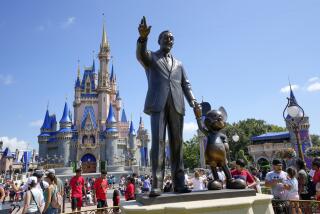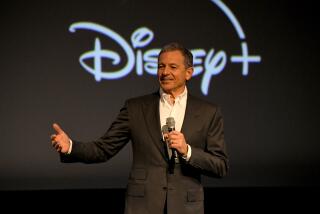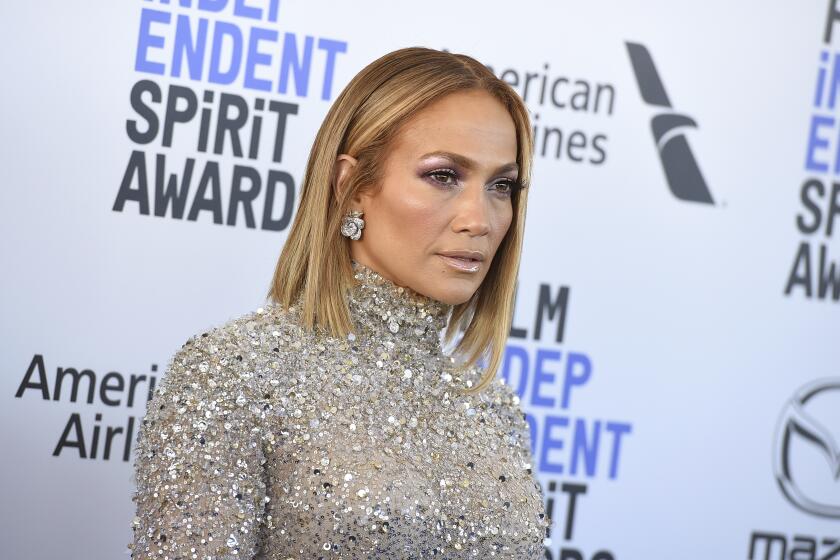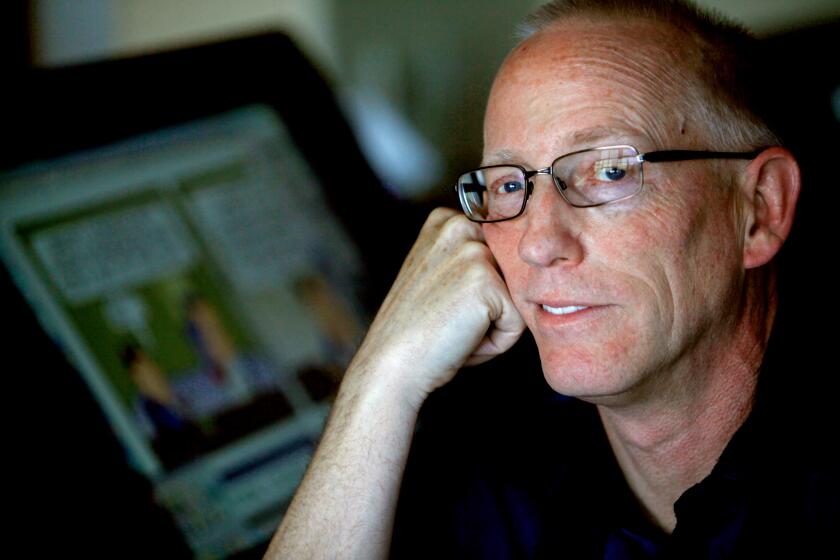Disney’s Eisner Loses Top Post, Stays as CEO
- Share via
PHILADELPHIA — Walt Disney Co.’s Michael Eisner, hobbled by a powerful shareholder revolt, was removed as chairman of the board Wednesday but will remain chief executive, an arrangement unlikely to end the controversy swirling around the famed entertainment company.
The board’s unanimous decision to strip Eisner of the title he has held for nearly 20 years came after a raucous annual shareholder meeting that closed with a dramatic announcement: In his reelection bid for the board, Eisner was rebuffed by 43% of shares cast.
The magnitude of that number -- unprecedented for a major corporation -- surprised Disney executives and Wall Street. Some analysts promptly suggested that sweeping changes were needed because so many shareholders had lost faith in the company’s operations. Usually, board members are elected with barely a whisper of protest.
Installed as Disney’s chairman late Wednesday was former U.S. Sen. George J. Mitchell, the board’s presiding director, who helped craft the strategy to separate the jobs of chairman and chief executive. Mitchell’s elevation drew immediate fire from critics because shareholders had delivered a blow to his credibility as well. Nearly of a quarter of the votes cast, also an unusually large proportion, did not support his reelection.
Dissident shareholders question Mitchell’s ability to oversee Eisner because of his vocal support of the executive. In the past, he was criticized for having business ties to Disney while sitting on the board.
Some observers say that by relinquishing the chairmanship, Eisner’s historically strong grip on day-to-day management will be weakened. Critics argue that the move is merely cosmetic and that nothing short of his departure from the company would end the controversy.
“It’s not about fence mending,” said Patrick McGurn, senior vice president of Institutional Shareholder Services, which advised stockholders to withhold their votes. “They have to rebuild an entire dam. The flood waters have washed over it.”
Christy Wood, chief investment officer for the California Public Employees’ Retirement System, which owns 9.9 million shares and did not vote for Eisner, agreed: “It’s too little, too late. It’s not enough. Shareholders are making a bigger statement.”
But the board, in its statement, made clear that Eisner would not be pushed out the door of the kingdom he has ruled, at times, with the sheer force of his personality.
“While making this change in governance, the board remains unanimous in its support of the company’s management team and of Michael Eisner, who will continue to serve as chief executive officer.... The board has confidence in the strategic direction of the company,” the statement said.
Interviewed by Ted Koppel Wednesday night on ABC News’ “Nightline,” Eisner said he did not consider the shareholders’ vote a referendum on his management or company performance. Instead, he said, the shareholder vote was about separating the chairman and CEO roles. “We heard our shareholders who seemed to be interested in that,” he said, “so we went ahead and did it.”
Eisner conceded, however, that there were “certain people that are not happy with me, personally, I guess.”
Still, Eisner said he had no plans to resign before his term expires in 2006. “My intention is definitely to serve that term out to its completion.”
A source close to the Disney board said Eisner, who was running unopposed, agreed to step aside as chairman and that some directors initially questioned how shareholders would react to appointing Mitchell to the post. Mitchell also expressed some reluctance, according to the source, who said the board ultimately believed he was “the best man for the job.”
The shareholder vote culminated several weeks of bitter campaigning by Eisner’s backers and his chief detractors, former directors Stanley P. Gold and Roy E. Disney, nephew of company founder Walt Disney. The two sides spent millions of dollars wooing large institutions and small shareholders.
Many stockholders, who believe the company’s legendary reputation and economic vitality has been tarnished by bad management, latched onto the grass-roots campaign that began with a modest “SaveDisney” website created by Gold and Roy Disney.
Company executives badly miscalculated the potential strength of the movement, which drew momentum from the timing of two major blows: the breakup of the prosperous relationship between Disney and Pixar Animation Studios as well as the unsolicited takeover bid by cable giant Comcast Corp.
On Wednesday, Comcast executives said they would not sweeten their bid but did ask to meet with Disney’s independent directors, those who do not hold management jobs in the company. Comcast said the vote against Eisner and Mitchell showed that shareholders believed Disney would be better served by new owners.
The board’s decision to replace Eisner as chairman followed a shareholder gathering that, for the first time, brought the combatants together.
In some ways, the meeting resembled a cross between a bitter political convention and a family picnic.
More than 3,000 shareholders walked past 75 giant Mickey Mouse statues while a Donald Duck danced to “Beauty and the Beast” with Cinderella through the Pennsylvania Convention Center.
Inside the Grand Hall the tone took a harder edge. At one point, the floor was turned over to Gold and Disney. Eisner watched as the two blistered him with criticism and urged that he be fired. Shareholders greeted the two with whoops, with a large number giving them a standing ovation.
“Shareholders have waited too long and have spoken too clearly,” Gold said. “Michael Eisner must leave now.”
When Disney took the stage he glanced at Eisner, then all but dared the executive to stop him from talking beyond the allotted 15 minutes the two were told they could have.
“I don’t care what the current management may tell you,” Disney said. “The plain fact is, you can’t fool all the people all of time, nor can you succeed in business trying to get by on the cheap.”
Eisner and Disney executives defended the company during their lengthy presentations, although they acknowledged that ABC’s prime-time ratings have been a disappointment, as have Disney’s retail stores, many of which are now for sale. But Eisner sought to present an upbeat message overall. “Your company has the management skill and the creative talent to continue on its growth trajectory,” he said.
Eisner generally refrained from criticizing Gold and Disney directly. After their litany of complaints, he thanked the two men as the audience laughed.
“That was a joy,” he said, and then added, “I think I have to say the conclusions you just heard are fundamentally wrong,” Eisner said. “Disney’s record of creating value is really indisputable.”
Eisner’s voice was hoarse and cracked several times, particularly toward the end of the meeting, at a time when everyone was waiting for results of the vote. Trying to lighten the mood, including his own, he accepted a motion to adjourn the meeting before announcing the tally. That prompted howls from the dissidents crowding the room. “Oh, the vote,” he said. “I almost got away with that.”
Disney shares lost 11 cents to $26.65 on the New York Stock Exchange. Disney made the announcement about Eisner and Mitchell after the market closed.
More to Read
The biggest entertainment stories
Get our big stories about Hollywood, film, television, music, arts, culture and more right in your inbox as soon as they publish.
You may occasionally receive promotional content from the Los Angeles Times.











